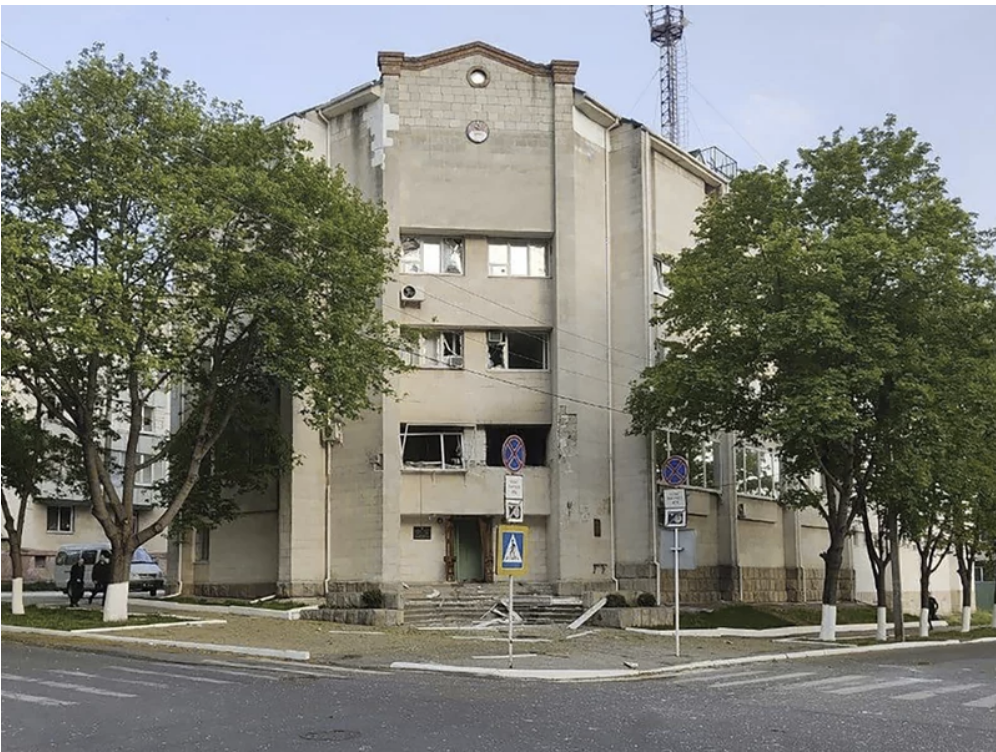Explosions hit Moldovan Government Building in Pro-Russian Separatist Region Transnistria
The damaged building on April 25, 2022, of the Moldovan Ministry of State Security in Tiraspol, the capital of the separatist region of Transnistria in Moldova. Photo: Ministry of Internal Affairs of Transnistria via Associated Press
On April 25, the Ministry of State Security building in Tiraspol, the proclaimed capital of the Moldovan breakaway region Transnistria, was rocked by several blasts that are believed to be from rocket-propelled grenades. No injuries were reported after the explosion, but the incident is a cause for concern for many in Moldova. The Moldovan Foreign Ministry warned that “the aim of today’s incident is to create pretexts for straining the security situation in the Transnistrian region, which is not controlled by the constitutional authorities.”
A second round of explosions went off the next day on April 26, which toppled two broadcast antennas. The antennas, which were used for broadcasting radio shows in Russian, were brought down in the small town of Maiac, close to the western Ukraine border. Similar to the explosions in Tiraspol, no one has claimed responsibility and no one was injured.
In response to the bombings, Moldovan President Maia Sandu held a meeting of the nation's Supreme Security Council. After the meeting, Sandu called for “citizens to keep calm and feel safe,” as the explosions are only “an attempt to escalate tensions.” In addition, she recommended that security should be increased at a buffer zone with Transnistria and that public safety measures need to be tightened and critical infrastructure needs to be checked.
She further blamed groups in Transnistria that benefit from instability for the blasts, specifically pro-Russian groups. Contrary to Sandu, Transnistrian leader Vadim Krasnoselsky blamed Ukraine for the explosions and demanded that Ukraine investigate the “illegal movement of … fighters on Transnistria’s territory and their committing a terrorist act on our territory.” Tensions between Russia, pro-Russian Transnistria, and the pro-EU governments of Moldova and Ukraine spark fears that Moldova may be the target of Russia's next invasion.
Destroyed radio antennas lying on the ground after explosions in a radio facility in Maiac, in the Moldovan separatist region of Transnistria, on April 26, 2022. Photo: Press Center of the Ministry of Internal Affairs of the Pridnestrovian Moldavian Republic via Associated Press
Concerns for a Russian invasion during or after the current invasion of Ukraine are at an all-time high. Moldovan-American psychologist Viorica Marian has been voicing these fears since the beginning of the Russian invasion of Ukraine, saying that Moldova is similar to Ukraine in that they are both developing democracies, former Soviet Republics, and not NATO members.
Like Luhansk and Donetsk in Ukraine, Transnistria in Moldova may be used by Russia as justification for an invasion. The region of 470,000 people has been under separatist control since the war in 1992 between the region and the rest of Moldova. Transnistria maintains close relations with Moscow along with having 1,500 Russian soldiers stationed there, which Russia calls “peacekeepers,” but Ukraine and Moldova worry that they will be used to invade either nation. Despite these close ties, Moscow hasn't officially recognized the region's independence from Moldova, as they have with Donetsk and Luhansk in Ukraine and South Ossetia and Abkhazia in Georgia.
These worries have materialized in statements made by Russian Major General Rustam Minnekayev, which say that the Russian military is seeking full control of Southern Ukraine to have “another way out to Transnistria.” Minnekayev also made the claim that the pro-EU government in Moldova is oppressing Russian speakers in Transnistria, a similar claim that Moscow made to justify their invasion of Ukraine.
However, in response to these comments, the Russian ambassador to Moldova called Minnekayev's comments “unfounded and contradicting Russia's position in support of the sovereignty and territorial integrity of our country within internationally recognised borders.” Amidst these worries, the United States of America has previously warned that Russian forces could fabricate “false-flag” operations that would justify another Russian invasion. Russian officials have denied any possibility of that occurring.


